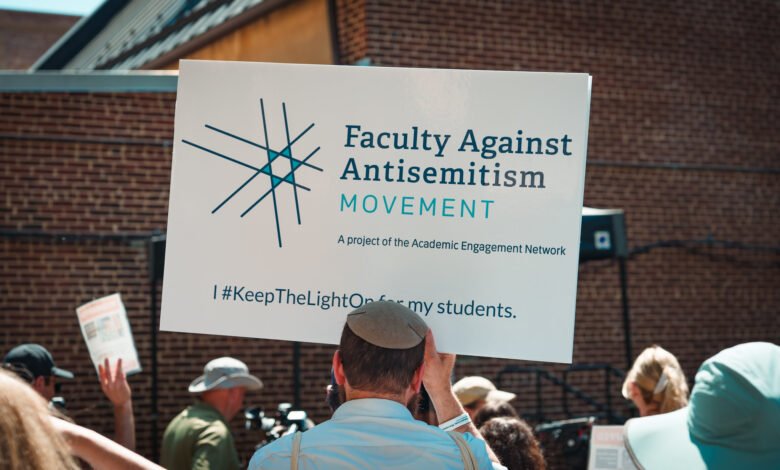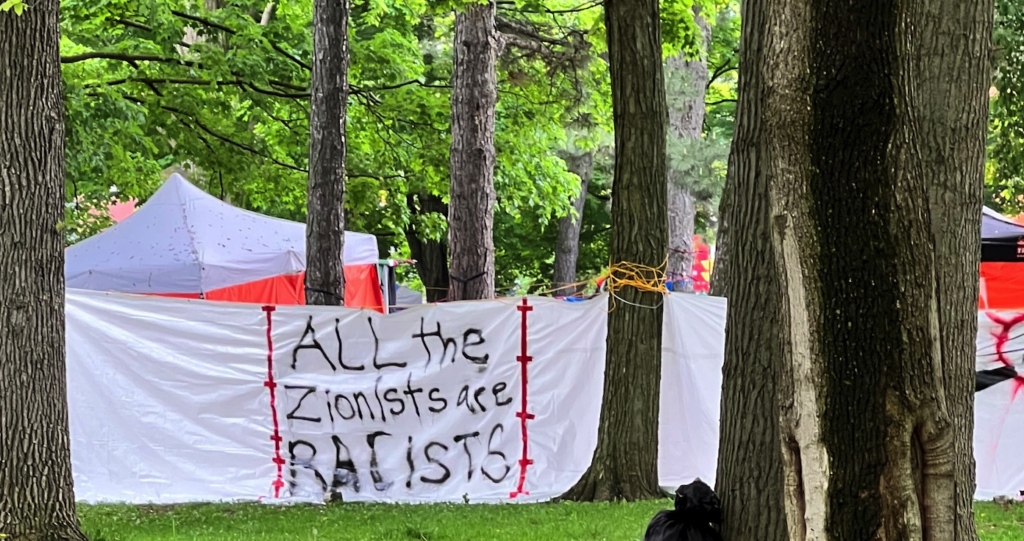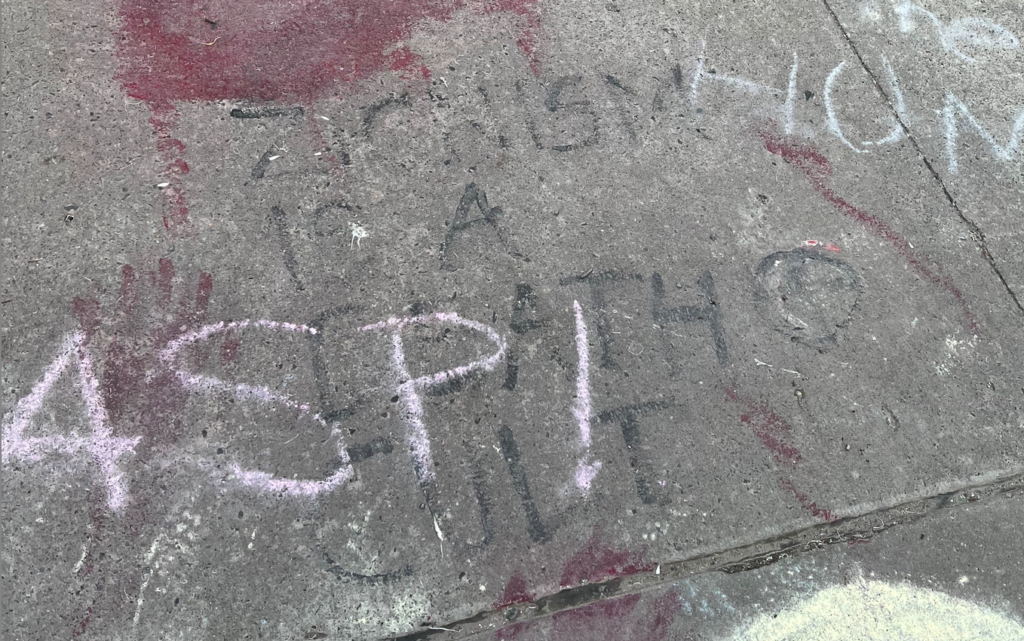Why Months of Jewish Discrimination and the Normalization of Antisemitism on University Campuses Must Stop

This weekend, two people approached a Jewish girls elementary school in Toronto and fired multiple gun shots. There was no one present at the school at the time, but the shooting will only heighten the fears of a Canadian Jewish community that has now experienced multiple shootings at schools and community centres, attacks on students, and vandalism at Jewish businesses and homes. Politicians moved quickly to issue statements condemning the incident, yet some are the same people that voted against measures to safeguard these institutions or have shown little regard for months about Canadian Jewish community concerns. Further, many supporters of recent protests, including the encampments at universities, have remained silent, presumably saving their voices for criticism of efforts to enforce campus policies to ensure that all students and faculty are safe. I recognize that many protest supporters will reject the suggestion that there is a link between recent campus protests and antisemitic violence, but to my mind, the linkage is clear. Indeed, by normalizing antisemitic speech and downplaying the safety and discrimination concerns of their Jewish colleagues and students, they have provided the fuel for the serious threats that have followed.
I have written previously on how Jewish students have a right to feel safe on campus and why real political leadership – not just tweets – are desperately needed to combat rising antisemitism. Those posts sparked what has become depressingly common for anyone that chooses to speak out against antisemitism, namely a torrent of hate, including false claims of support for genocide, personal threats, and dismissal of concerns as fabrications or propaganda. This may trigger a similar response, but now is not the time for silence.
In my 26 years as a professor, there have been numerous discussions regarding safety on campus for vulnerable groups including Black students, Indigenous students, Muslim students, LGBTQ students, trans students, and women student groups. The response in each instance involved a commitment to establish measures to ensure that everyone on campus feels safe. But not this time. This time – when Jewish students and faculty make those claims – we are told there is no right to “feel” safe. Alternatively, skeptics point out that some Jews do feel safe, as if that negates those who do not (try to imagine the reaction if the response to women saying they do not feel safe on campus was to identify a small minority who disagreed).
The double standards involve more than just the response to campus safety. The horrors of sexual assault on October 7th are somehow still dismissed by some as unproven or a “weaponization” of sexual assault claims or even as propaganda. Believe all women has been a foundational principle on campuses, yet not this time. Meanwhile, campus encampments are described as peaceful, but entry is often restricted to those who adhere to particular political beliefs. It is impossible to imagine universities tolerating students occupying public spaces in support of other issues such as anti-vax measures or doing nothing if encampment leaders denied Black or Indigenous students entry to a public space. However, for weeks those calling for the immediate release of hostages or who express support for Israel have been blocked or harassed at encampments that are implausibly called “peaceful protests.”
Indeed, the claims of peaceful protest are inconsistent with messaging such as “all the Zionists are racists” or “Zionism is a death cult” that has been seen at the University of Ottawa encampment, alongside chants that “all the Zionists are terrorists.”

University of Ottawa, May 2024

University of Ottawa, Tabaret, May 2024
As Prime Minister Justin Trudeau stated earlier this month:
“In a country like Canada, it should be and it must be safe to declare oneself a Zionist. Jewish or not, Zionism is not a dirty word or something anyone should be targeted for agreeing with. It is the belief, at its simplest, that Jewish people, like all peoples, have the right to determine their own future.”
Chants claiming all Muslims are terrorists would rightly be condemned as Islamophobia, yet saying the same thing about those who believe that Jews have the right to determine their future in their own state is characterized as legitimate. University policies leave no doubt that students have the right “to be treated with respect and dignity and without harassment and discrimination.” It is simply not credible to argue that those policies are being upheld and enforced with respect to Jewish students.
As antisemitic incidents have skyrocketed since October 7th, the political response has often emphasized that Jewish Canadians cannot be held responsible for the actions of the Israeli government. That is obviously true not only because Jewish Canadians are not responsible for Israeli government policy, but also because support for Israel is not the same as support for the Israeli government. I am a strong supporter of Israel, but that does not mean I support all the actions of the current government. That is actually the norm for many people regardless of their country. If the polls are correct, a minority of Canadians support the current Canadian government, but I’m quite certain the overwhelming majority still support Canada.
When Jewish students or faculty raise concerns about their safety or the hate associated with activities on campus, the typical response is the assurance that anti-Zionism is not antisemitism. However, the reality is that the vast majority of Jews say that “caring about Israel is an essential or important part of what being Jewish means to them.” That doesn’t mean they necessarily support the Israeli government, but when they hear “we don’t want no two state, we want all of it”, such comments are clearly at odds with recognition of Israel’s right to exist and therefore strikes at the heart of what is an essential part of being Jewish for the majority of Jews.
Further, even if the intent is not antisemitic, universities have long emphasized that is effect, not intent, that matters. For example, we would never dismiss an Indigenous or LGBTQ student concern about actions they considered discriminatory on the basis of assurances that there was no discriminatory intent. In fact, the opposite is true as university EDI documents state that discrimination is often unintentional. What matters is not what the speaker or initiator intended, but rather the impact on the affected individual. In the case of Jewish students, however – whether Zionist or otherwise – they are told that how they perceive the speech or campus actions is irrelevant, effectively meaning Jews do not get to decide for themselves what is antisemitic and giving licence to others to cause harms on the basis of their professed intent.
It is the cumulative effect of months of this discrimination – Jewish students and faculty left to feel unsafe on campus, told their political or religious beliefs are unwelcome, or the failure to enforce university policies on student non-discrimination – that has created a normalization of antisemitism that was once unthinkable on Canadian campuses. For years, I spoke out on discrimination issues such as the Muslim travel ban in the U.S. or the emergence of the Black Lives Matter movement. Like many, I thought that the university community and political leaders would similarly support the Jewish community in our hour of need. Instead, for many there has been silence at best and active campaigning against my community at worst. While universities must safeguard freedom of expression and space for legitimate criticism of the Israeli government, we can ill-afford more days where Jewish students are harassed, discriminatorily targeted, or excluded on campus for their beliefs. I look to our political and university leaders to do what is right and stop this nightmarish new antisemitic normal.

